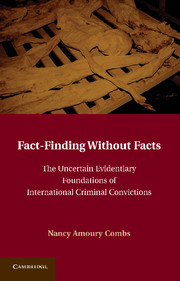 Fact-Finding without Facts
Fact-Finding without Facts Book contents
- Frontmatter
- Contents
- Acknowledgments
- Introduction
- 1 The Evidence Supporting International Criminal Convictions
- 2 Questions Unanswered: International Witnesses and the Information Unconveyed
- 3 The Educational, Linguistic, and Cultural Impediments to Accurate Fact-Finding at the International Tribunals
- 4 Of Inconsistencies and Their Explanations
- 5 Perjury: The Counternarrative
- 6 Expectations Unfulfilled: The Consequences of the Fact-Finding Impediments
- 7 Casual Indifference: The Trial Chambers' Treatment of Testimonial Deficiencies
- 8 Organizational Liability Revived: The Pro-Conviction Bias Explained
- 9 Help Needed: Practical Suggestions and Procedural Reforms to Improve Fact-Finding Accuracy
- 10 Assessing the Status Quo: They Are Not Doing What They Say They Are Doing, but Is What They Are Doing Worth Doing?
- Conclusion
- Bibliography
- Index
- References
Introduction
Published online by Cambridge University Press: 05 October 2010
- Frontmatter
- Contents
- Acknowledgments
- Introduction
- 1 The Evidence Supporting International Criminal Convictions
- 2 Questions Unanswered: International Witnesses and the Information Unconveyed
- 3 The Educational, Linguistic, and Cultural Impediments to Accurate Fact-Finding at the International Tribunals
- 4 Of Inconsistencies and Their Explanations
- 5 Perjury: The Counternarrative
- 6 Expectations Unfulfilled: The Consequences of the Fact-Finding Impediments
- 7 Casual Indifference: The Trial Chambers' Treatment of Testimonial Deficiencies
- 8 Organizational Liability Revived: The Pro-Conviction Bias Explained
- 9 Help Needed: Practical Suggestions and Procedural Reforms to Improve Fact-Finding Accuracy
- 10 Assessing the Status Quo: They Are Not Doing What They Say They Are Doing, but Is What They Are Doing Worth Doing?
- Conclusion
- Bibliography
- Index
- References
Summary
After decades of inactivity, international criminal law has lately emerged as one of the most rapidly developing and influential subjects of international law and global politics. Sixty years after Nazi offenders were prosecuted at Nuremberg, the international community established an international criminal tribunal to prosecute those responsible for international crimes in the former Yugoslavia (ICTY). The ICTY spawned a number of progeny, including the International Criminal Tribunal for Rwanda (ICTR), the Special Court for Sierra Leone (SCSL), the Special Panels in the Dili District Court in East Timor (Special Panels), the Extraordinary Chambers in the Courts of Cambodia, the Special Tribunal for Lebanon and, most importantly, a permanent International Criminal Court (ICC). The establishment of these institutions constitutes, in Mark Drumbl's words, “one of the more extensive waves of institution-building in modern international relations.”
Most international law scholars warmly greeted the establishment of these tribunals. Although large-scale atrocities have been committed since the dawn of humanity, for most of human history these atrocities have not elicited criminal sanctions. So, the move to impose accountability on brutal dictators who were responsible for widespread death, suffering, and destruction was considered a tremendous advance, and early commentators credited international criminal prosecutions with promoting a host of praiseworthy purposes. International criminal prosecutions were said to affirm the rule of law in previously lawless societies, to promote peace building and transition to democracy in war-torn lands, to assist in reconciling former enemies, to deter future megalomaniacs from committing similar crimes, to create a historical record of the conflict, and to diminish the victims' propensity to blame collectively all those in the offenders' group.
- Type
- Chapter
- Information
- Fact-Finding without FactsThe Uncertain Evidentiary Foundations of International Criminal Convictions, pp. 1 - 10Publisher: Cambridge University PressPrint publication year: 2010


